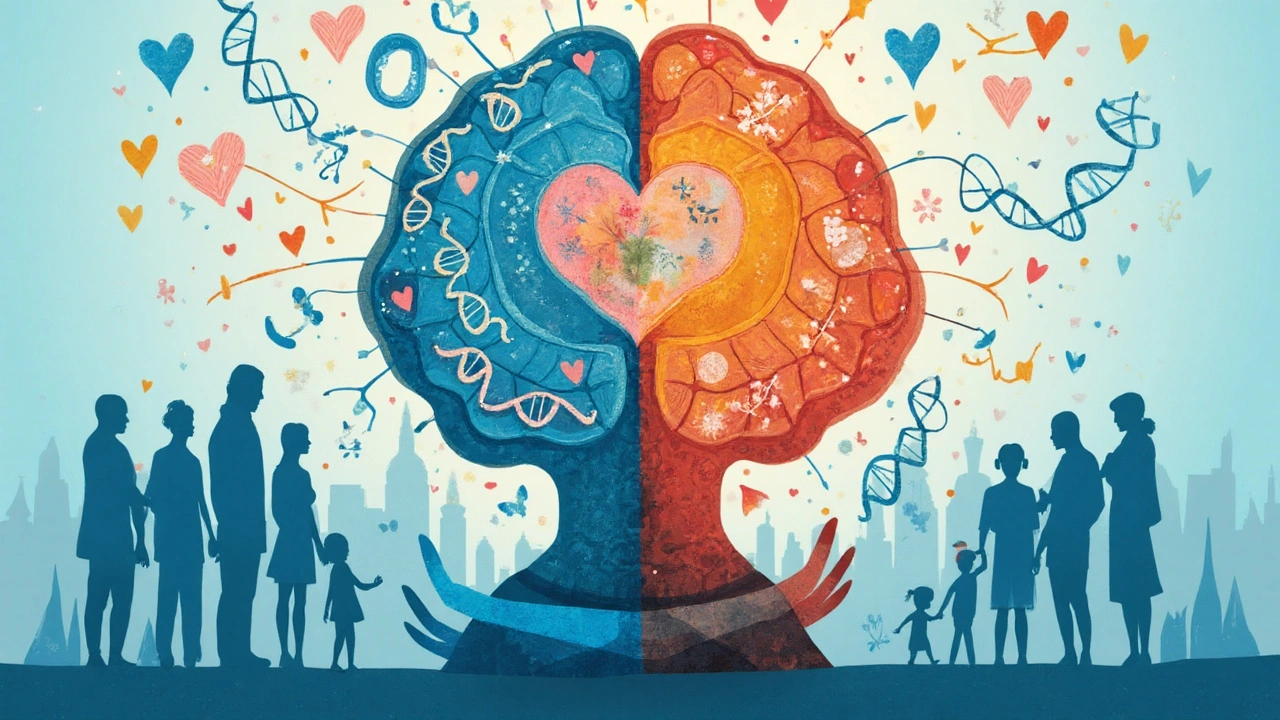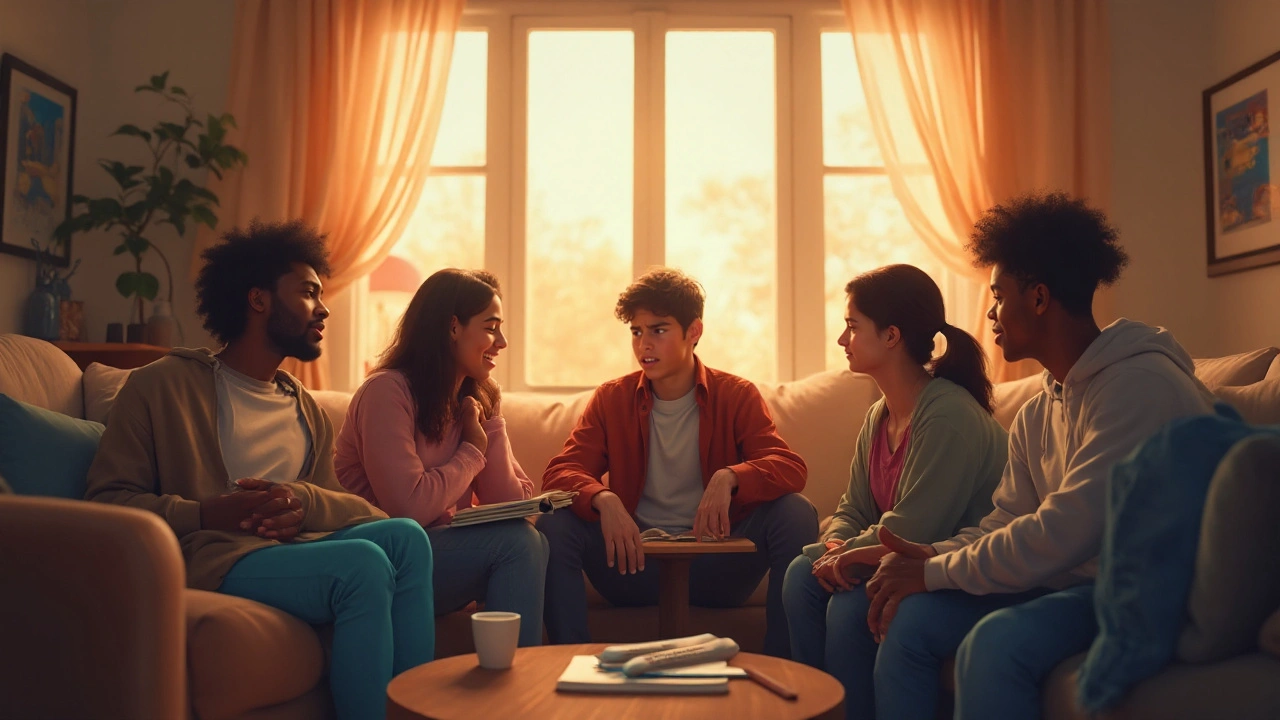Cancer doesn’t just hit where you can see it—it strikes deep in places that don’t show up on a scan or blood test. Anyone who hears 'chromosome-positive lymphoblastic leukemia' for themselves or someone close knows it flips life upside down. Doctors usually focus on chemotherapy schedules and remission rates, but what about when the fear keeps you up at night—when every twinge makes your stomach drop? It’s easy to overlook how much this diagnosis messes with your head. Yet, the emotional impact can be just as intense as the physical stuff. If you’re reading this because of a fresh diagnosis or to support someone you love, you’re not alone in feeling blindsided by the anxiety, sadness, or anger that crashes in. There’s more to the story than medical terms and white coats. Let’s talk about what it really means to navigate this kind of leukemia—from a mental health angle that too often gets drowned out by talk of chromosomes and cell counts.
What Makes Chromosome-Positive Lymphoblastic Leukemia Different?
The first shock with chromosome-positive lymphoblastic leukemia is usually in the name—long, intimidating, with that extra word, "chromosome," thrown in. What’s up with that? Well, this type of leukemia, often called Philadelphia chromosome-positive (Ph+) leukemia, is marked by a swap between two chromosomes (9 and 22, to be specific), fusing two genes into one trouble-making agent called BCR-ABL. This isn't rare either: In adults with acute lymphoblastic leukemia (ALL), about 1 in 4 have the Ph+ version. What does this mean? For one thing, the treatment—while improving—tends to be harder on the body, combining intense chemo with targeted drugs like imatinib. The stakes are higher. The side effects? They’re rough: hair loss, fatigue, relentless bone pain, infections, and sometimes months spent mostly in hospital. Many find these changes batter not only their body, but also their confidence and sense of 'normal.' When you add the word "chromosome," it bumps up the fear. It signals to people this isn’t just basic cancer—it has a deeper, trickier cause and a treatment path that’s hard to understand or predict. It’s an isolating diagnosis. You start to feel like you’ve landed on some kind of medical island where nobody quite speaks your emotional language anymore, not even the people closest to you. That’s the first hit to your mental health: feeling different at the very moment you crave reassurance most.
The Invisible Weight: Psychological Effects of Leukemia
People often expect you to "stay strong." But how do you do that when everything familiar evaporates? The mind scrambles to adapt, and it’s rarely a smooth ride. There are huge spikes in stress and anxiety, especially around the early days after diagnosis. Waiting for biopsy results or wondering if transplant is on the table can crank up nerves to the breaking point. Many people describe long periods of sadness that go beyond “feeling a bit low.” It’s more like a thick fog—persistent, sticky, and impossible to shake with willpower alone. In fact, clinically significant depression crops up in around 1 in 3 leukemia patients, according to recent cancer psychology studies. Insomnia comes up a lot, too. Your body’s wiped out and screaming for sleep, but the mind runs through "what ifs": Will this treatment work? What happens next year? Will life ever feel safe again? Cancer treatment itself can trip up brain chemistry, leaving you vulnerable to mood swings. The steroids prescribed during chemo make emotions even more of a rollercoaster. Of course, there’s also the confusion from “chemo brain”—the foggy, forgetful state that’s nothing like ordinary tiredness. There are days when attention span and memory feel as scrambled as a dropped jigsaw puzzle. Social circles tighten because friends and even family sometimes don’t know what to say. Being left out, even accidentally, can sting as much as the needles at the clinic. Sometimes guilt enters the room too. You might feel ashamed for getting sick or for not being your usual self—even though you’ve done nothing wrong. All of this weighs down your mental resilience, making recovery feel harder and increasing the risk that fear, not hope, will guide your outlook.

The Ripple Effect on Family and Relationships
No matter how tough you try to be, leukemia doesn’t care about the boundaries of your life. It butts into jobs, school, friendships, even romance without an invite. Parents often swing between terror and guilt—feeling helpless, and sometimes blaming themselves for not catching it “sooner” (even though chromosome swaps happen by random chance, not anyone’s fault). Siblings and partners can feel abandoned while caretaking, or drained from putting on a brave face. Children might take on adult roles at home, rushing to help out and pushing their own worries aside, only to melt down later. Some family members get stuck in "fix it" mode—offering advice when all you want is someone to listen. If your social circle has shrunk, it’s common. Leukemia isn’t contagious, but isolation is: Those hours spent at hospital and weeks in recovery cost you time and energy to keep up friendships. After a while, invitations drop off, texts go unanswered on both sides. Intimacy can change too. When your body feels invaded by illness or you’re not sure what the future holds, it’s hard to talk about sex or hugs, or sometimes even just sitting together in silence. Those moments can leave you craving closeness, and then feeling let down when it’s awkward or missing. Family counseling or group meetings (often run at UK cancer support centres like Maggie’s or local Macmillan hubs) offer a safe place for everyone to let their guard down. People say it’s a relief to hear—sometimes for the first time—that what they’re feeling is normal. It helps prevent family rifts or resentment from growing, and reminds everyone they’re still on the same team, fighting the same battle.
Facing Fears: Managing Mental Health During Treatment
So, with all these challenges packed into one diagnosis, what actually helps? The good news is mental health support keeps getting better, even if you have to search for it. Start by being honest about symptoms. Most cancers units in the UK now have a psycho-oncology nurse or psychologist who “gets” the unique stress of cancer. Asking for a chat doesn’t make you weak—it’s a sign you’re protecting your most critical resource: your mind. Mindfulness practices like short breathing exercises work wonders. Even just focusing on your breath for two minutes—counting each inhale and exhale—can shift you from panic to present. The NHS recommends apps like Headspace or Calm, with special programmes for cancer stress. Don’t wait for things to hit breaking point. Schedule regular mental health check-ins (same way you’d keep tabs on blood counts or temperature spikes). If you’re comfortable, write out what you’re feeling in a journal. It’s not silly—studies show writing helps people untangle fears and see patterns in their emotions. Movement, even a slow walk around your garden, releases endorphins that fight off the physical drag of sadness. Diet matters more than you think for your energy and mood. Try to keep meals regular, snacks gentle on your stomach, and hydration topped up. If you’re on treatment that messes with appetite, ask for a dietician referral—it’s worth it. Medications like antidepressants or anti-anxiety drugs are tools, not last resorts. Don’t be afraid to talk to your GP or team about what’s safe and what can help. And try to keep some small routines that connect you to the life you had before—Friday movie night, favorite playlists, even silly rituals like making your tea a certain way. These little anchors remind you of who you are outside of the patient role—and bolster mental strength. Above all, remember you don’t need to "win" every day. Small steps count. Most breakthroughs in *chromosome-positive lymphoblastic leukemia* care started with someone raising their hand to say, "I need help." That’s how mental health moves forward, too.

Realistic Hope: Moving Toward Recovery and Acceptance
Hope isn’t about ignoring hard realities—it’s about finding sparks of light while living with uncertainty. Treatments for chromosome-positive ALL have changed dramatically. Ten years ago, survival rates were much lower. Targeted drugs like tyrosine kinase inhibitors (imatinib, dasatinib) have bumped up five-year survival in adults by nearly 40%. That doesn’t erase the fact that roadblocks—side effects, relapse scares—still show up. But now more people aren’t just surviving, they’re thinking about life beyond treatment. Acceptance doesn’t mean you have to love your diagnosis. It means giving yourself space to feel angry, tired, or frustrated—without guilt. Cancer support groups, both in-person and online, are lifesavers. UK charities like Blood Cancer UK have peer chat rooms and mentor programs, so you can vent to people who genuinely get it. Even swapping tips on post-chemo nausea or fatigue with a fellow survivor can lift mood and give you a sense of solidarity—a reality check that you’re not alone in this fight. Sometimes hope comes from silly places, too: dog videos on YouTube, new gardening projects, or gushing about a random good day when food actually tastes good. Don’t underestimate these moments. They stack up over weeks and months, forming the backbone for recovery—not just for your body, but for your mental health. And if you have days when the fear surges back in, remember, you’re allowed to call for backup, even after treatment ends. You’re stronger for it—mind, body, chromosomes, and all.

Diane Helene Lalande
August 13, 2025 AT 20:59Thank you for writing this — it's the kind of thing that gets overlooked far too often.
Mental health is not a side note in cancer care, it's part of the treatment plan. Practical things like asking for a referral to a psycho-oncology nurse, keeping a simple daily log of mood and sleep, and naming one small thing each day that felt okay can make a real difference. When energy is low, routines should be tiny and achievable: a five-minute walk, a single cup of tea enjoyed without screens, a short breathing exercise before bed.
Caregivers need support too; they burn out quickly and their distress feeds back into the person being treated. If you can, set up short weekly check-ins with someone who can help with logistics so the emotional load isn't carried alone.
There is no shame in asking for help — it's steady work, not a one-off fix.
Josh SEBRING
August 18, 2025 AT 03:50Okay, not to be difficult, but I have to ask — are we sure this isn’t leaning a little too far into "feel-good" tips while the real problem is access to proper medical care and staffing?
I mean, mindfulness and journaling are fine, but if people can't get timely chemo slots, or their meds are rationed, suggestions about playlists feel... not fully relevant. That said, for folks actually in a treatment pathway those tiny tools can be the difference between falling apart on a bad day and making it through a clinic visit.
Also, calling it an "island" is accurate; hospitals can be alienating spaces. Real fix would be better integration of mental health into oncology clinics, not just pamphlets pushed after rounds.
Cindy Knox
August 22, 2025 AT 10:41Totally agree — even a two minute grounding exercise can actually calm the panic enough to get through a scan day.
Shawn Towner
August 26, 2025 AT 17:33Right, but to push back a bit: access issues are real, yes, but we shouldn't discard low-cost interventions just because the system is broken. People still need something to use now.
The ideal is both — better services plus immediate coping strategies for day-to-day survival. Expecting otherwise is performative compassion.
And while you can criticize mindfulness as trendy, the evidence base for brief, structured interventions in oncology settings keeps growing, so dismissing them wholesale is a mistake.
Ujjwal prakash
August 31, 2025 AT 00:24Spot on, in many places the system is the problem, absolutely — but small wins count!!!
If you can get a trusted nurse to agree to a weekly 10-minute check-in, that becomes a lifeline, and it costs almost nothing, besides a little will and coordination.
Also, diet, hydration, movement — these are underrated pillars, they do change mood and energy, dramatically, when attended to consistently.
Don't wait for permission from an official to take the small actions you can manage today, start, measure, iterate, and then demand better care with evidence of how you responded.
Lily Tung
September 4, 2025 AT 07:16This post is necessary because it insists on the parity of mental and physical health in a domain that historically treats psychological distress as an ancillary inconvenience rather than an integral component of morbidity, and that insistence deserves to be unpacked at length.
First, please allow me to underline a distinction that is commonly elided in public discourse: the psychological sequelae of leukemia are not simply an expected emotional response but frequently represent diagnosable and treatable conditions which, if ignored, can materially worsen clinical outcomes, adherence to therapy, and overall quality of life.
Second, the term "chromosome-positive" functions as a linguistic amplifier — it makes the threat seem not merely biological but somehow deterministically ominous, and that semantic framing can intensify anticipatory anxiety in ways clinicians do not always account for during consent conversations.
Third, when clinicians focus almost exclusively on hematologic metrics they may inadvertently communicate that numbers are the only currency that matters, which delegitimises patient narratives about exhaustion, cognitive change, and social withdrawal and thus creates barriers to appropriate psychosocial referrals.
Fourth, practical interventions ought to be evidence-informed and context-sensitive: brief cognitive behavioural strategies adapted for oncology settings, integration of psychiatric assessment into routine visits, and the provision of liaison psychiatry when steroids or targeted therapies produce mood lability are all measures that should be standard rather than exceptional.
Fifth, the social dimension — which includes caregiver burnout, role reversal within families, and shifting identity — demands systemic responses: access to subsidised counselling, caregiver respite, and workplace protections for those undergoing treatment or who are family caregivers.
Sixth, the cultural scripting of "stay strong" not only invalidates grief but imposes an additional moral burden, often prompting underreporting of symptoms and avoidance of palliative psychosocial services; clinicians should actively normalise disclosure of fear and sadness.
Seventh, the phenomenon known colloquially as "chemo brain" warrants greater research investment and clinical recognition; patients report substantive deficits in executive function and memory that impact vocational reintegration and interpersonal functioning long after cytotoxic exposure.
Eighth, small behavioural anchors — predictable rituals, social rituals preserved despite illness, and the maintenance of a few leisure activities — have disproportionate benefits for identity preservation and mood stabilization, and clinicians should encourage these deliberately.
Ninth, digital resources like curated apps or tele-psychology can bridge geographical gaps but should be vetted carefully for oncology-specific content and privacy protections, which are often inadequate in commercial offerings.
Tenth, health systems that measure success solely by remission rates miss a fuller picture of survivorship; incorporating patient-reported outcome measures related to mental health into routine audits will change priorities and resource allocation.
Finally, hope should be framed realistically: conveyed as a set of attainable, short-term goals that restore agency rather than as unfalsifiable optimism, because when hope is honest it empowers rather than disillusions.
In short, this essay is important because it insists we look beyond hematologic indices and treat the person — cognition, mood, family dynamics, and all — with the same rigor we apply to cellular morphology.
Melissa Gerard
September 8, 2025 AT 14:07Long read but some good points — wish fewer buzzwords though :)
Also, not every patient wants a deep dive into therapy, sometimes a buddy to rant to helps more, and that's ok. :)
Jason Petersen
September 12, 2025 AT 20:59Look — the emotional stuff is real, and people suffer, yes, but much of what's being suggested here is repackaged common sense dressed up as innovation.
Systems fail, clinicians are stretched, and individual coping techniques are useful but they don't substitute for structural fixes.
That tension is the salient point: don't let self-care rhetoric absolve institutions of responsibility.